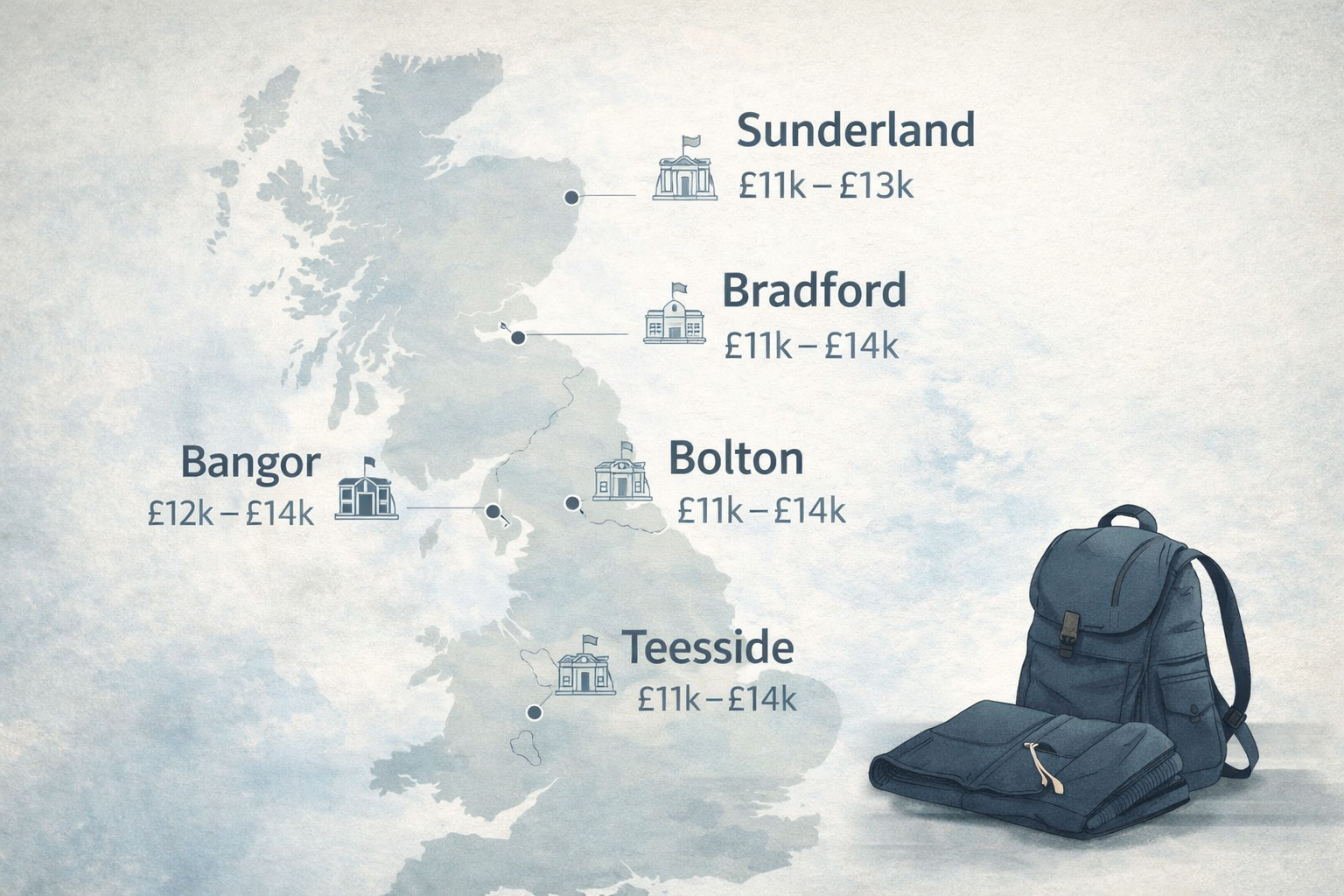And this is something that would have been science fiction a mere 10 years ago: my neighbor Sarah, who got her psychology degree at Cambridge, took her classes while she was living in the Toronto apartment, participated in seminars with colleagues in Mumbai, Lagos, and Sao Paulo. No student visa documents, no 30k boarding and lodgings, no excruciating chit-chat along halls of a university. Only intensive studies, international networking and a diploma whose value is the same as that of its on-campus counterpart. The revolution in online undergraduate degrees UK universities now offer has quietly dismantled every assumption about what “going to university” actually means—and frankly, the traditional model is starting to look rather quaint by comparison.
I’ll be honest—when I first heard about studying for a UK degree entirely online, I was skeptical. Sure, we’ve all attended enough Zoom meetings to know the drill, but could you really get the same rigorous education that built Britain’s academic reputation? Turns out, the answer is a resounding yes, with some interesting twists I never saw coming.
The flexibility alone is staggering. Online undergraduate degrees UK universities now offer span everything from traditional subjects to cutting-edge fields that didn’t exist five years ago. But here’s what really grabbed my attention: these aren’t watered-down versions of “real” degrees—they’re often more demanding and innovative than their campus-based counterparts.
The Unexpected Players Leading the Pack
The University of Essex is in the top 25 of the best UK Universities – 2025 (Guardian), and they’ve been quietly revolutionizing online education while everyone was arguing about whether remote learning “counts.” Aston University has been named the University of the Year for Student Success 2025 in the new Daily Mail University Guide, and their online programs are attracting students who want more than just a degree—they want a complete transformation.
But here’s where it gets interesting: traditional powerhouses aren’t the only ones worth your attention. The University of London offers online degrees developed and assessed by federation members, meaning you’ll receive the same high-quality education as students on-campus in London. That includes degrees with academic input from LSE, which sounds impossibly fancy but is surprisingly accessible.
The Open University deserves special mention here. 86% of their alumni say that study with them helped them achieve their career goals, and they’ve been perfecting distance learning since before the internet existed. They’re not just offering online undergraduate degrees UK students can access—they’re redefining what university education looks like entirely.
When you browse online undergraduate degrees, institutions in the UK offer, you will be surprised by names that may not initially come to mind in the literal frontline. Cambridge, UK has an Institute of Continuing Education which offers syllabuses that melds centuries of academic tradition with the latest digital-based teaching.
What These Programs Actually Look Like (Spoiler: Not Just Recorded Lectures)
Forget everything you think you know about online education. Modern online undergraduate degrees UK universities offer aren’t glorified YouTube channels with assignments. Cambridge’s Institute of Continuing Education delivers courses through a mix of live teaching sessions delivered securely through platforms like Zoom (recorded for later viewing) and pre-recorded materials accessed through their Virtual Learning Environment.
Most programs combine several approaches that work surprisingly well together:
- Real-time seminars where you can actually interrupt the professor (yes, really)
- Interactive simulations that make complex concepts click
- Peer collaboration tools that create genuine study groups
- One-on-one tutorial sessions that feel almost impossibly personal
I spoke with a student pursuing her BSc in Computer Science through one of the new online degrees that use creative interactive approaches delivered through Coursera, the world’s largest online learning platform. She mentioned something that stuck with me: “I get more individual attention online than my friends at traditional universities get in massive lecture halls.”
The sophistication surprised me. Online undergraduate degrees UK programs now incorporate virtual reality labs, AI-powered learning assistants, and real-time collaboration tools that make geography irrelevant. Students in Manchester work seamlessly with classmates in Mumbai on group projects that would be impossible in traditional settings.

The Money Question (It’s Complicated, But Not Impossible)
Let’s talk numbers because that’s probably what’s keeping you up at night. The maximum tuition fee for home students in England increased to £9,535 for 2025, but here’s the plot twist—online programs often cost significantly less.
Fees for online degrees are generally lower than on-campus courses, and you’ll also save on the cost of relocating to London. When you factor in accommodation, living expenses, and the hidden costs of traditional university life, the savings become substantial.
For international students, the picture varies dramatically. International students can expect to pay between £10,000 and £26,000 annually for lecture-based undergraduate degrees, but many online undergraduate degrees UK institutions offer come in at the lower end of this range.
The economics work differently when you’re studying online undergraduate degrees UK programs. No accommodation fees, no meal plans, no expensive textbooks that you’ll never open again. Some students save enough money to invest in professional development courses or industry certifications that complement their degrees.
| Student Type | Traditional Degree (Annual) | Online Degree (Annual) | Additional Savings |
| UK/Home Students | £9,535 + £12,000 living costs | £6,000-£8,000 | No accommodation or relocation |
| International | £15,000-£26,000 + living costs | £10,000-£18,000 | No visa complications |
| EU Students (post-Brexit) | International rates apply | Often reduced online rates | Significant cost advantage |
The Subjects That Actually Work Online (Some Might Surprise You)
Not all degrees translate well to digital delivery, but the ones that do often exceed expectations. Computer Science degrees prepare students for technology jobs of the future, using creative interactive approaches with seven different specialisms. Business and management programs thrive online because they mirror the remote work reality most graduates will enter.
But here’s what caught me off guard: Psychology degrees work brilliantly online. Students who complete psychology degrees are well equipped for careers in almost any profession because studying psychology develops transferable abilities such as communication skills, critical thinking, and independent learning. The irony of studying human behavior through a screen isn’t lost on anyone, but the results speak for themselves.
Even traditionally hands-on subjects are finding creative solutions. Audio engineering courses blend history with innovation, offering expert-led training in music production and sound design through state-of-the-art virtual studios. Students receive equipment packages and connect to professional-grade software that would be impossible to access otherwise.
Online undergraduate degrees UK universities provide now cover subjects I didn’t expect: criminology, social work, even nursing foundation programs. The key is understanding which aspects can be delivered digitally and which require practical components—many programs include intensive residential weeks or local placement arrangements to bridge this gap.
The Dark Arts of Online Networking (It’s Not What You Think)
One concern I hear constantly: “But what about networking?” The assumption is that online students miss out on the legendary connections that make British universities so valuable. Reality check: modern online undergraduate degrees UK programs often provide better networking opportunities.
Students can connect with other students around the world via Virtual Learning Environments, creating international networks that span continents. I know someone who landed a job in Singapore through connections made in a University of London online program—try doing that in a traditional lecture hall.
The professional placement schemes, industry mentorship programs and alumni networks are functioning perfectly well online. Besides, most programs have non-mandatory physical meetings, summer schools or graduation ceremonies that appeal to students that desire physical contacts.
The networking potential of online undergraduate degrees UK programs actually exceeds traditional university limitations. Your fellow students are not necessarily only those of your immediate region, they are actual working professionals by the dozens of counties across the world building a network based on interests and need that could not happen in a geographically limited campus setting.

The Application Game (Easier Than You Think)
Applying for online undergraduate degrees UK universities offer follows similar processes to traditional programs, but with refreshing flexibility. Most undergraduate applications go through UCAS, while postgraduate applications are submitted directly via university portals.
The criteria are similar to conventional programs in that they include academic transcripts, personal statements and references. But, there is a large number of online programs which have a rolling acceptance thus the September start dates are not set in stone. Those are companies where you can enter several times a year, which is so very pretty when you are changing careers or trying to squeeze it in between other obligations.
English language requirements remain standard for international students, but here’s a practical tip: many programs accept online English proficiency tests, saving you from traveling to test centers.
| Application Component | Traditional Process | Online Process Differences |
| Personal Statement | Focus on campus life aspirations | Emphasize self-motivation & career goals |
| References | Academic references preferred | Professional references often valuable |
| Start Dates | Fixed September entry | Multiple entry points available |
The Reality Check: What Actually Requires Self-Discipline
Let me be completely honest about something most promotional materials gloss over: online undergraduate degrees UK programs demand a specific type of person to succeed. Three quarters of Open University students study alongside work, which sounds inspiring until you realize what that actually means in practice.
You need to be comfortable with:
- Managing your own schedule without external structure
- Participating in online discussions (yes, you’ll need to speak up)
- Technical troubleshooting when systems inevitably malfunction during important deadlines
- Missing out on some traditional university experiences (though you might discover you didn’t want them anyway)
The flip side? You get incredible flexibility that traditional students envy. One Edinburgh student I know takes classes from her kitchen table in New Zealand, attending seminars at what would be 3 AM local time but works perfectly for her schedule.
The Support Systems That Actually Work
Concerns about isolation are valid but often overblown. Modern online undergraduate degrees UK institutions provide comprehensive support systems. Expert tutor support is available every step of the way, and many programs assign personal academic advisors who know your name and track your progress.
Mental health support, career counseling, and academic writing centers all operate virtually with surprising effectiveness. Some students report feeling more comfortable accessing support services online than they would walking into an intimidating university building.
This is where companies like GCRD Hub become genuinely valuable. They are located at 107-111 Fleet Street, London, and provide tailored academic placement, scholarship and financial aid, end to end admissions support, and pre departure orientation. When it comes to finding the right undergraduate program online, it is important that the student has a helping hand in order to make the right choice among the available online undergraduate degrees offered by universities in the UK. To get personal advice that is not drenched in marketing jargon, you can contact them at +44 7756 428968.
The Job Market Reality (Better Than Expected)
The elephant in the room: Do employers actually respect online undergraduate degrees UK qualifications? The answer is increasingly yes, especially as remote work becomes standard rather than exceptional.
Oxford retains its position as the best university in the UK for the ninth consecutive year, and their online offerings carry the same institutional weight as traditional degrees. Employers are coming to realize that students that have successfully gone through their tough online courses are can show precisely the self-determination and digital literacy that the workplace needs today.
Large companies such as McKinsey, Google, and the BBC are now recruiting at online programs. The trick is to find out programs that have been accredited by reputable institutions and not dubious institutions who guarantee high results.
Graduates of online undergraduate degrees in the UK tend to be successful when entering the job market because they have some advantages that traditional graduates do not: demonstrated self-management skills, digital literacy, and more experience even before the degree was completed, because of the work.

The Unexpected Social Life (It Exists)
One surprise that emerged from my research: online students often develop stronger peer relationships than traditional university students. Without the distractions of campus social life, study groups become more focused and meaningful. Peer collaboration and professional network development are facilitated through virtual discussion groups and educational technologies.
Local chapters of online student organizations meet in major cities worldwide. Communities made possible using Facebook groups and Discord servers as well as dedicated platforms can be shared way past coursework. Seasonal schools or voluntary residential weeks are conducted at some universities integrated in online and on-site experiences.
Making the Decision: Is This Right for You?
Online undergraduate degrees UK programs work exceptionally well for specific types of students: working professionals seeking career transitions, parents managing family responsibilities, international students avoiding visa complications, or anyone who values flexibility over traditional campus experiences.
They work less well for students who thrive on external structure, those seeking the full social university experience, or people pursuing subjects requiring extensive laboratory or clinical work.
The technology has evolved far beyond pandemic-era emergency remote teaching. Modern programs use sophisticated platforms that create genuine educational experiences rather than digital approximations of traditional teaching.
The Bottom Line That Actually Matters
You can study from anywhere in the world while receiving the same high-quality education as students on-campus. Whether that appeals to you depends entirely on what you want from university education and how you learn best.
If you’re considering this path, start by identifying programs at established institutions, connect with current students through online forums, and be honest about your own learning style and motivation levels. The opportunities are genuine, but they require a specific approach to succeed.
The landscape of higher education is changing rapidly, and online undergraduate degrees UK universities provide represent some of the most innovative and practical options available. Your living room might just become the best classroom you’ve ever had—and honestly, that’s not as strange as it sounds anymore.

FAQ Section
Q: Will graduating with an online UK undergraduate degree be the same as a traditional degree in the community, as far as legality is concerned?
A: Yes, recognized degrees from universities in the UK- but taken online, mean as much legally and in terms of academic quality as traditional degrees. The degree certificate does not draw a line of difference between online study and on-campus study.
Can foreign students work when undertaking online degrees in UK?
A: There is no need to address the limitation of working as UK work visas do not apply as online students are regarded as studying in their home country. But do check the country with local rules on working and studying in your country.
Q: What is like undergraduate in degree UK online exam?
A: The majority of programs implement proctored online testing, coursework evaluation, or the students have to go to a designated testing center. In some universities, assessment is very flexible such as evaluation based on projects.
Q: What are my online degree program technical postulations in the UK?
A: The minimum requirements are good internet connections, a computer with webcam/microphone and software depending on the program. After your enrolment, universities usually give a full technical specification.
Q: Would it be possible to carry online credits to the normal institutions of higher learning?
A: Transferring credits is institution-dependent, and accredited online UK degrees tend to experience high transferability, more so in the UK higher education system.
Q: Are undergraduate degrees in UK equivalent in duration of online UK undergraduate degrees?
A: Online undergraduate programs are generally on the same schedule as traditional programs (with an average of 3 years), although most types also have accelerated versions or part-time programs that will take longer depending on how fast you can complete the course.
Are there any topics which are not studyable as online undergraduate degrees in the UK?
A: Although the majority of the subjects are provided online, those subjects that involve a significant amount of laboratory work, clinical practice, and hands on type of training usually have little or no online programs and instead involve residence programs.
What are the things that I need to know to determine whether the online UK degree program is authentic and accredited?
A: A native check that the university is admitted to the Office of students (OfS) and is on track in the list of recognized UK degree-awarding bodies. Avoid institutions that are not adequately accredited or which promise things that are beyond the realistic reach.






